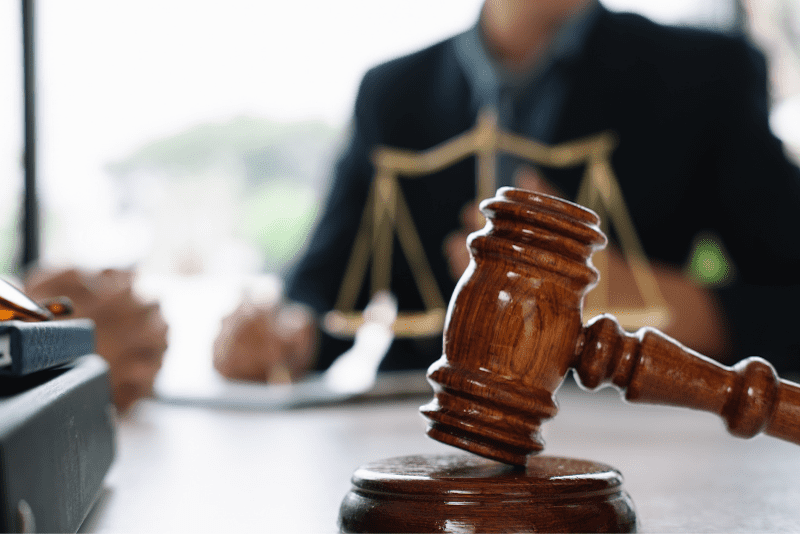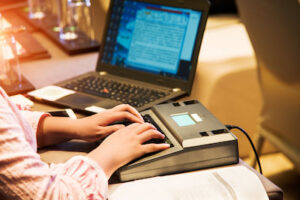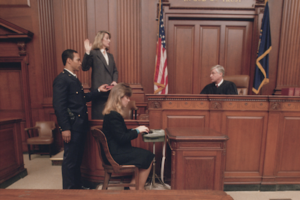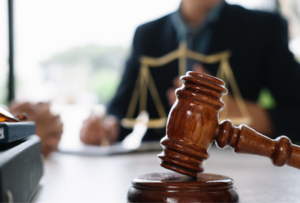
07 Nov How Does a Court Reporter Machine Work?
Understanding How A Court Reporter Machine Works
Every court, whether civil or criminal, must have a court reporter present to capture the details of a trial. Therefore, it is important to know how a court reporter machine works. Capturing accurate and verbatim proceedings for judicial review is extremely important to effectively review a case for either appeal or simply fact-finding purposes. To make the process as efficient as possible, the legal system utilized technology to reduce human error and increase the reliability of the transcriptions of court proceedings. Whether you are involved in a legal proceeding are just curious, continue reading to find out how this recording machine works in court.
So, how does a court reporter machine work? A court reporter machine works by recording sound that enters into a microphone and then it is written out in shorthand. That shorthand is then translated by another person who understands shorthand. A court reporting machine is very easy to use, they have a foot peddle and you can adjust the volume of what is being recorded by using your voice or how hard you press your foot.
Keep reading to learn more about how court reporter machines work and how they are used in today’s legal system.
What is a Court Reporter Machine?
A court reporter machine is an electronic device that records audio from one or more microphones directly to its internal data storage so it can be played back later.
Typical Use of a Court Reporter Machine
A courtroom will have at least one digital voice recorder available during any lengthy proceedings where minutes from trials are taken by hand so they can be transcribed into official documentation later. Modern-day court reporter machines can also provide instant playback from their digital display.
These devices are also typically equipped with a headphone jack so the court reporter can monitor proceedings without disrupting anyone else from hearing the audio from the microphone. Most high-quality recorders will allow you to set multiple “bookmarks” in any recording when playback is paused for a particular event. This includes situations such as the speaker changing or if someone in the courtroom coughed during a particularly quiet part of a long testimony.
The sensitivity and settings of each microphone used in conjunction with these recorders can be changed depending on what type of environment you’re working in and shouldn’t pose too much trouble once initial settings are properly configured before recording begins.
Who Uses Court Reporter Machines?
Court reporter machines are commonly used by legal professionals to take notes about what happened in a trial. This is because they are not allowed to bring down anything with writing utensils or paper due to its impact on potential witnesses. These devices can also be used as personal dictaphones since they store sound waves rather than written language through digital storage software.
Process of Using a Court Reporter Machine
 A legal professional that records hearings will ensure that all parties involved are prepped before doing extensive interviews.
A legal professional that records hearings will ensure that all parties involved are prepped before doing extensive interviews.
Most of the participants in a session will be aware of where microphones are placed during recording. Any witnesses that may be called to testify should be briefed on their proximity to the microphone before testifying.
This includes witnesses whose testimony might pose potential danger or threats. As soon as court proceedings begin, this party will press record and electronically record everything that is said for future review.
Once you’re done recording, simply stop recording using either your finger or an external remote control device that is connected to your recorder.
Courtroom reporter machines typically do not have noise-canceling features. It’s important for everyone involved with taking minutes in a trial-style proceeding to understand how these devices operate so they can properly plan out their actions beforehand.
Components of a Court Reporter Machine
There are many components to a court reporter machine. When recording, the device records sound waves onto its storage rather than onto tape like how it works in tape recorders. Some state that you can even use these devices as dictaphones because they are like personalized stenographers.
The materials used for analysis are not big at all. Court reporter machines are very compact and almost all of them are portable. This allows them to fit inside any bag or backpack. Makers also make sure that these items have other features such as USB connections so people can upload their recordings using electronic transfer services.
There are other types of recorders that might need more skills to operate. Most modern-day models, however, have preinstalled programs so everything is simpler to understand and follow during recording.
Features Available on Modern Day Court Recorders
Court reporter machines come with preinstalled programs that make it easier for users to understand how the device operates. Some devices also contain extra conveniences such as double display screens, automatic bookmarks during recording, etc.
Meanwhile, most court reporter machines don’t need too much power consumption. They typically come with long-lasting batteries for convenience purposes. Today’s court recorders are seamlessly interchangeable between different operating systems like Mac and Windows depending on what operating system you prefer.
Most recently, they also have USB connections. This allows people to upload their recordings through electronic transfer services like Dropbox or iCloud.
Today’s court reporter machines are very easy to use and come with preinstalled programs for your convenience. They can even be swapped between different operating systems like Mac or Windows. Some devices even come with USB connections and long-lasting batteries for added convenience.
Court reporter machines are helpful and efficient ways to record legal proceedings. However, human stenographers are still typically present in the courtroom.
Purpose of a Stenographer
 The main purpose of a stenographer is to transcribe everything said during court proceedings. This includes hearings and trials where there is no way for someone to take minutes due to legal reasons.
The main purpose of a stenographer is to transcribe everything said during court proceedings. This includes hearings and trials where there is no way for someone to take minutes due to legal reasons.
Of course, a valid question is why stenographers are still needed if court proceedings can be videotaped and their audio recorded?
It may be helpful to consider what would happen if there were no court stenographers.
Video and audio recordings can be manipulated. Because of this, stenographers are responsible for giving accurate transcripts of what was said in court. This allows everyone to read the evidence at their own pace, instead of listening to it while watching the screen.
Even though other recording methods exist, below are three reasons why we should still have stenographers.
1. Reporting in Real-Time
Audio and voice recordings are usually turned into transcripts, but only after legal proceedings have been concluded. Furthermore, electronic recordings are sometimes paused to review the testimony of those involved in proceedings. If something is being said in meantime, it will not be captured in the video or voice recordings.
However, stenographers transcribe everything that is being said in a courtroom as it is occurring in real-time.
2. Dialogue Overlap
There are many times that multiple people may speak at the same time. In video and audio recordings, it is often difficult to determine what was being said and from whom it came. However, since a stenographer is present, the person can request that testimony be repeated one at a time and transcribe each statement accurately.
3. Unreliable Captionist Programs
As many know, there are text-to-speech programs available to do the work of a court reporter. However, these options often have limitations and can be unreliable when it comes to spelling names and understanding different accents.
When people mispronounce words or are difficult to understand because they are mumbling, stenographers can clarify these aspects and also capture the intonations of each speaker in the recording process.
Highly Skilled Court Recorders
Stenography requires years of training, attention to detail, and an ability to maintain concentration for long periods. Stenographers must type every single word that is spoken during a trial. This may take hours or days to finish conveying everything that was said.
Without accurate records of what was said in court, it would be difficult to know what happened or who was responsible.
Modern Day Example of the Need for Human Stenographers
There have been many cases where video and audio recordings were manipulated.
Rodney King Trial
 The Rodney King Trial was a high-profile case that should have ended with a conviction of the police officers involved. However, their lawyers claimed that they edited the footage shown on TV so that it looked as though King provoked them.
The Rodney King Trial was a high-profile case that should have ended with a conviction of the police officers involved. However, their lawyers claimed that they edited the footage shown on TV so that it looked as though King provoked them.
This argument swayed jurors into acquitting these cops! They were exonerated despite overwhelming evidence against them.
Someone had tampered with the video to make King look like he deserved to get beaten up by those cops. If there had been stenographers present during this trial, this might not have happened. The true details of what happened during the trial would have been on record.
Humans & Technology in Court Reporting
Technology, in many ways, has made our lives much easier. Many people’s futures are determined in the courtroom. Technological advances in audio and video recordings have made a difference in ensuring that justice is truly served.
However, technology has in no way made stenography obsolete. Stenographers are experts in their field and capture much more than court recording machines ever can. One is not more important than the other.
They both work together to improve the court recording process and make the legal system strong in determining the responsibility of each party and the consequences of the same. Working in partnership, court reporter machines and stenographers keep up with every single word spoken so that every statement is recorded.





